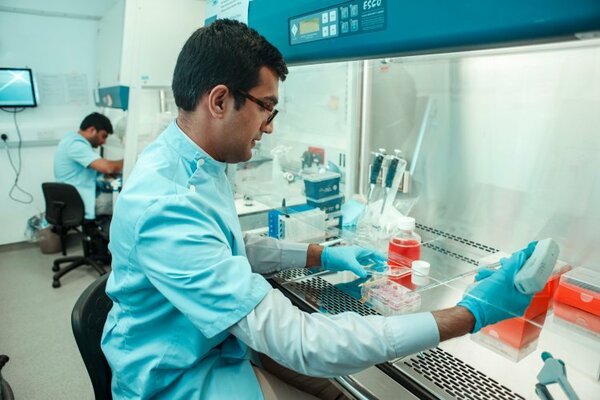Foundation Hails New MND Research
20 January 2021
20 January 2021
We are delighted to share news of an encouraging new MND study which provides new focus for potential drug treatments.
A laboratory study has shed light on how the damage to nerve cells caused by motor neuron disease (MND) can be repaired by improving the energy levels in mitochondria - the power supply to the motor neurons.
The study received vital funding from My Name’5 Doddie Foundation as well as the Medical Research Council, Motor Neurone Disease Association, Euan MacDonald Centre for MND Research, UK Dementia Research Institute and Anne Rowling Regenerative Neurology Clinic.
Researchers have discovered that, in human stem cell models of MND, the axon, the long part of the motor neuron cell that connects to the muscle, is shorter than in healthy cells. Also the movement of the mitochondria, which travel up and down the axons, is impaired.
The scientists showed that this was caused by a defective energy supply from the mitochondria and that by boosting the mitochondria, the axon reverted back to normal.
The study was led by Dr Arpan Mehta alongside Dr Bhuvaneish Selvaraj and Professor Siddharthan Chandran from the Euan MacDonald Centre for MND Research at the University of Edinburgh.
The researchers used stem cells taken from people with the C9orf72 gene mutation that causes both MND and frontotemporal dementia. They used these stem cells to generate motor neuron cells in the lab to use in their experiments.
The study also examined human post-mortem spinal cord tissue from people with MND who had kindly donated their tissue through the Medical Research Council Edinburgh Brain and Tissue Bank. The results supported the findings from the stem cells. vMND, also known as amyotrophic lateral sclerosis or ALS, is a progressive condition that causes muscles to waste away. It occurs when nerve cells called motor neurons, which send messages from the brain and spinal cord to the body’s muscles, stop working properly.
More than 1500 people are diagnosed with MND in the UK each year. There is no cure and half of people affected die within two years of diagnosis.
Although the research focused on the people with the commonest genetic cause of ALS, researchers are hopeful that the results will also apply to other forms of the disease.
The results of the study are now being used to look for existing drugs that boost mitochondrial function and may be able to be repurposed to treat MND.
Dr Arpan Mehta, Lady Edith Wolfson Fellow and PhD student at the University of Edinburgh, said: “The importance of the axon in motor nerve cells cannot be overstated.
“Our data provides hope that by restoring the cell’s energy source we can protect the axons and their connection to muscle from degeneration. Work is already underway to identify existing licensed drugs that can boost the mitochondria and repair the motor neurons. This will then pave the way to test them in clinical trials.”
Arpan paid tribute to the contribution of My Name'5 Doddie Foundation, "I had the privilege of meeting Doddie and his wife at the MND-SMART launch event last year. Four years ago, I decided to take some time out of my clinical training in Oxford to undertake a PhD in laboratory research into MND. I was blown away by the opportunities present in Edinburgh and so decided to come up to Scotland.
"I am pleased to report that today – the culmination of my PhD work – has seen the publication of our research focussing on boosting the cellular batteries – mitochondria – in ALS to treat degeneration of the axon in motor nerve cells in ALS. The work paves the way for drug screening endeavours, which are underway in our lab."
"Siddharthan’s lab is generously funded by the My Name’5 Doddie Foundation and we wanted to let you know that your support has enabled this research to come to fruition. We’d be grateful if you would kindly convey our heartfelt thanks to Doddie Weir and his family for all that they have done and continue to do for ALS/MND. Doddie inspires us to work hard in the lab and clinic to fight MND with the same vigour that he does. Words cannot express the true effect of his support. I am also grateful to the Foundation for re-tweeting the news, allowing it to reach the widest audience possible."
References:

I am pleased to report that today – the culmination of my PhD work – has seen the publication of our research focussing on boosting the cellular batteries – mitochondria – in ALS to treat degeneration of the axon in motor nerve cells in ALS. The work paves the way for drug screening endeavours, which are underway in our lab.
